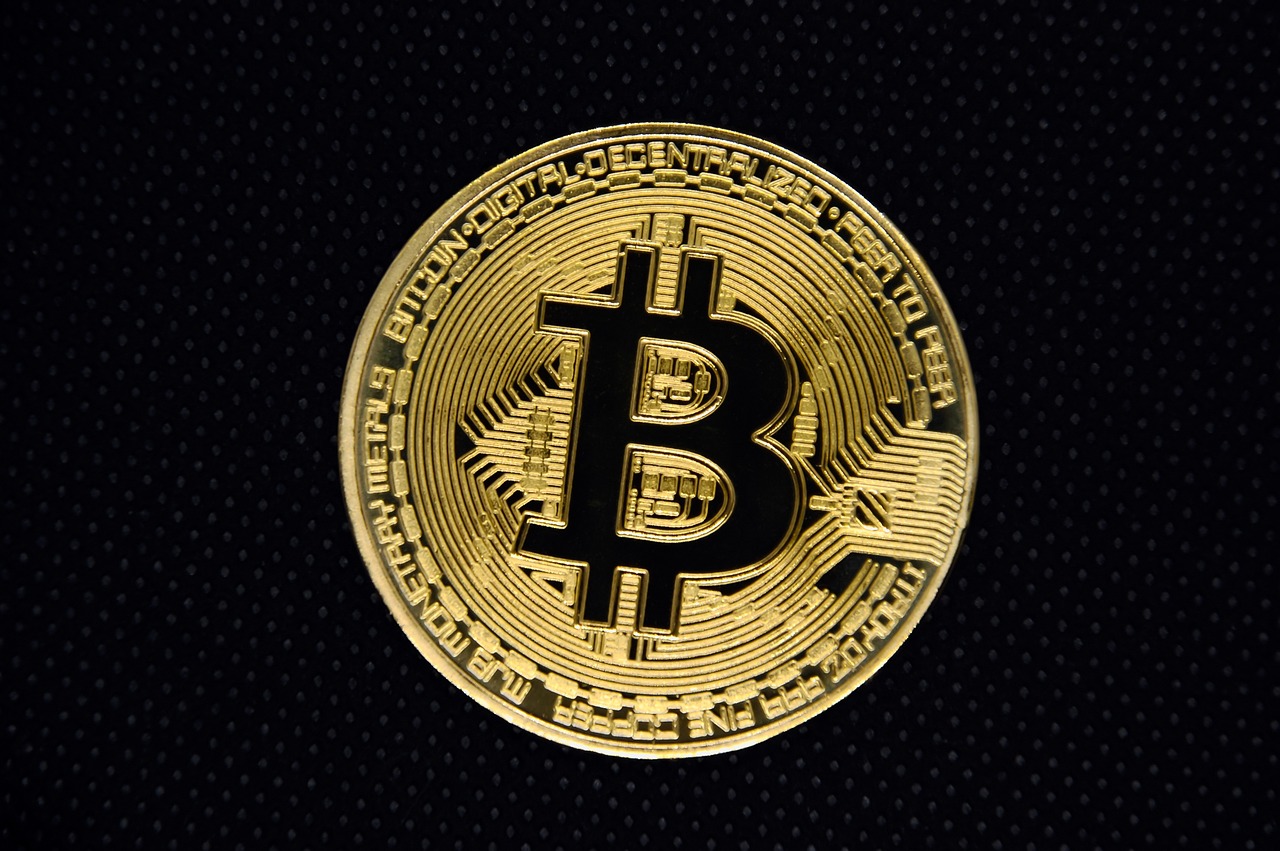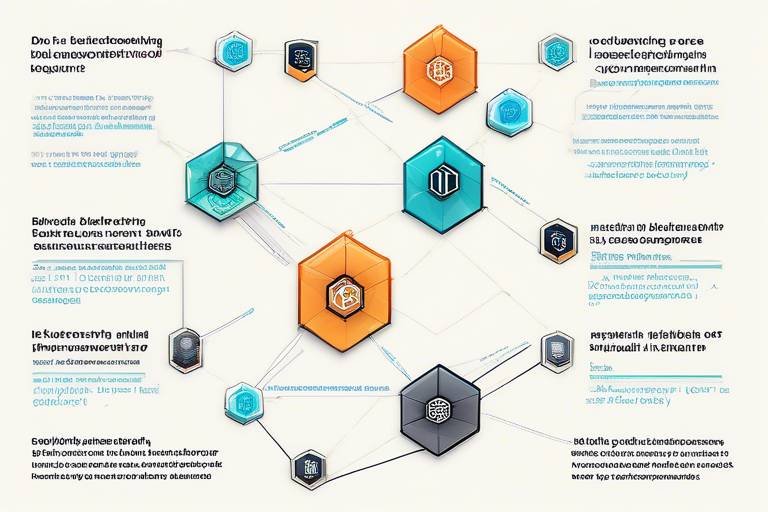How Blockchain Can Improve Supply Chain Efficiency
In today's fast-paced world, the need for efficient supply chain management has never been more critical. With the increasing complexity of global trade, businesses are constantly seeking innovative solutions to streamline their operations. Enter blockchain technology, a game-changer that promises to revolutionize supply chains across various industries. Imagine a world where every transaction is recorded transparently, every product can be traced back to its origin, and all stakeholders can collaborate seamlessly. Sounds like a dream, right? Well, it's becoming a reality, and this article will delve into how blockchain can enhance supply chain efficiency through improved transparency, traceability, and collaboration.
At its core, blockchain is a decentralized digital ledger that securely records transactions across multiple computers. Think of it as a digital notebook that everyone can see but no one can erase. Each entry, or block, is linked to the previous one, forming a chain that is virtually tamper-proof. This fundamental principle of blockchain technology is what makes it so appealing for supply chain management. By decentralizing data storage, blockchain eliminates the need for a central authority, reducing the risk of fraud and errors. In supply chains, this means that every participant—from manufacturers to consumers—can access the same information in real-time, fostering a more collaborative environment.
Implementing blockchain in supply chains offers a plethora of advantages that can significantly enhance operational efficiency. Let's explore some of the key benefits:
One of the standout features of blockchain is its ability to provide a transparent view of the supply chain. Imagine being able to track a product from the moment it leaves the factory to when it arrives at the consumer's doorstep. With blockchain, all participants can access real-time data regarding the status of goods, which not only helps in timely decision-making but also builds trust among stakeholders. This transparency minimizes disputes and enhances accountability, as everyone involved can verify transactions as they occur.
With blockchain, the days of waiting for updates or relying on third-party reports are over. All parties involved in the supply chain can view and verify transactions as they happen. This real-time data access leads to improved operational efficiency, allowing businesses to respond quickly to changes in demand or supply disruptions. For instance, if a shipment is delayed, everyone in the chain is immediately notified, enabling proactive measures to mitigate the impact.
The immutable nature of blockchain ensures that once a transaction is recorded, it cannot be altered or deleted. This characteristic fosters a culture of accountability and trust among supply chain participants. When businesses know that their actions are permanently documented, they are more likely to adhere to best practices and regulatory requirements. This is particularly crucial in industries such as food and pharmaceuticals, where safety and compliance are paramount.
Traceability is another critical aspect of supply chain management, especially in sectors like food and pharmaceuticals. Consumers today are more conscious about the origins of the products they purchase. With blockchain, tracking products from their origin to the consumer becomes a breeze. Imagine being able to scan a QR code on your food package and instantly see where it was sourced, how it was processed, and when it was shipped. This level of traceability not only ensures safety and compliance but also enhances consumer confidence in the brand.
While the benefits of blockchain are compelling, implementing this technology in supply chains is not without its challenges. Organizations must navigate various obstacles to fully realize the potential of blockchain solutions.
Adopting blockchain technology requires significant investment in infrastructure and training. Many organizations, especially small and medium-sized enterprises, may find this to be a daunting barrier. The transition to a blockchain-based system involves not only financial costs but also a shift in mindset and operational processes.
Another hurdle is the complex regulatory landscape surrounding blockchain technology. Different regions have varying laws and standards that can complicate the implementation process. Organizations must stay informed and compliant with these regulations to avoid legal pitfalls.
- What is blockchain technology? Blockchain is a decentralized digital ledger that records transactions securely across multiple computers.
- How does blockchain improve supply chain efficiency? It enhances transparency, traceability, and collaboration among stakeholders.
- What are the challenges of implementing blockchain? Key challenges include technological barriers and regulatory compliance issues.

Understanding Blockchain Technology
Blockchain technology is often likened to a digital fortress, standing strong against the winds of tampering and fraud. At its core, blockchain is a decentralized digital ledger that securely records transactions across multiple computers. This means that no single entity holds all the power; instead, the data is distributed, making it nearly impossible for any one party to manipulate the information. Imagine a neighborhood watch where everyone keeps an eye on each other, ensuring that no one can get away with wrongdoing. That's the essence of blockchain.
The fundamental principles of blockchain revolve around three key concepts: decentralization, transparency, and security. Decentralization eliminates the need for a central authority, which not only reduces the risk of corruption but also enhances the resilience of the system. Transparency allows all participants in the supply chain to see the same data, leading to a more collaborative environment. Lastly, security is ensured through cryptographic techniques that protect the integrity of the data, making it extremely difficult for malicious actors to alter records.
In the context of supply chain management, blockchain can be a game changer. It enables a real-time view of the entire supply chain, from raw materials to finished products. This visibility is crucial for making informed decisions. For example, if a batch of food products is found to be contaminated, blockchain allows companies to quickly trace the source and remove affected items from the shelves, thereby protecting consumers and minimizing losses.
One of the most exciting aspects of blockchain is its potential to foster collaboration among various stakeholders in the supply chain. By using a shared ledger, suppliers, manufacturers, and retailers can work together more effectively, reducing delays and improving overall efficiency. Imagine a symphony orchestra where every musician knows their part and plays in harmony; that's how blockchain can unify different players in a supply chain.
However, understanding blockchain is just the tip of the iceberg. The technology is still evolving, and as it matures, we can expect to see even more innovative applications across various industries. As we dive deeper into the benefits and challenges of implementing blockchain in supply chains, it's essential to keep in mind that while the technology offers immense potential, it also requires careful consideration and strategic planning for successful adoption.

Benefits of Blockchain in Supply Chains
Implementing blockchain technology within supply chains is like adding a turbocharger to an already efficient engine; it amplifies performance and brings a host of benefits that can revolutionize operations. One of the most significant advantages is the increase in transparency. Imagine a world where every participant in the supply chain has access to real-time data regarding product status, shipment location, and transaction history. This level of openness not only builds trust among stakeholders but also minimizes disputes and enhances collaboration. When everyone is on the same page, the entire system operates more smoothly, reducing friction and inefficiencies.
Another critical benefit is the reduction of fraud. In traditional supply chains, the potential for fraudulent activities is ever-present, whether it's counterfeit goods or misrepresentation of product origins. Blockchain's inherent characteristics, such as its immutable ledger, ensure that once a transaction is recorded, it cannot be altered. This feature acts as a powerful deterrent against fraud, making it easier to verify the authenticity of products. For instance, in the food industry, consumers can trace the journey of their groceries from farm to table, confirming that they are purchasing genuine, safe products.
Furthermore, blockchain promotes enhanced collaboration among supply chain participants. By providing a shared platform, it enables various stakeholders—manufacturers, suppliers, logistics providers, and retailers—to interact seamlessly. This interconnectedness leads to improved communication and coordination, allowing for quicker response times to market changes. When challenges arise, such as delays or shortages, the ability to access and share real-time data means that solutions can be implemented swiftly, minimizing disruptions.
To summarize, the benefits of blockchain in supply chains can be encapsulated in the following points:
- Increased Transparency: All parties can access real-time data, fostering trust and accountability.
- Reduced Fraud: Immutable records deter fraudulent activities and ensure product authenticity.
- Enhanced Collaboration: A shared platform improves communication among stakeholders, leading to quicker problem-solving.
As we move further into an era where efficiency and accountability are paramount, the implementation of blockchain technology in supply chains is not just a trend; it is becoming a necessity. Companies that embrace this innovation will not only gain a competitive edge but also pave the way for a more transparent and trustworthy marketplace.
Q1: What is blockchain technology?
A1: Blockchain is a decentralized digital ledger that records transactions across multiple computers, ensuring security and transparency.
Q2: How does blockchain improve supply chain efficiency?
A2: By providing real-time data access, reducing fraud, and enhancing collaboration among stakeholders, blockchain streamlines operations and improves decision-making.
Q3: Are there any challenges in implementing blockchain in supply chains?
A3: Yes, challenges include technological barriers, integration issues, and navigating regulatory compliance across different regions.

Enhanced Transparency
Imagine a world where every transaction is visible to all parties involved, where you can trace the journey of a product from its origin to your doorstep without any guesswork. Blockchain technology offers just that! By providing a transparent view of the supply chain, it allows all participants to access real-time data, creating an ecosystem of trust and accountability. This is not just a theoretical benefit; it’s a practical solution that is revolutionizing how businesses operate.
With blockchain, every transaction is recorded in a secure and immutable way. This means that once a transaction is added to the blockchain, it cannot be altered or deleted. As a result, all stakeholders—from manufacturers to retailers to consumers—can verify the authenticity of the data. This level of transparency is particularly beneficial in industries where trust is paramount, such as food and pharmaceuticals. For instance, if a consumer wants to know where their food comes from, they can easily trace its journey back to the farm using blockchain data.
Furthermore, this transparency fosters a culture of accountability among supply chain participants. When everyone can see the same data, it creates a sense of responsibility. If something goes wrong—like a product recall—companies can quickly identify the source of the problem and address it without finger-pointing. This not only enhances operational efficiency but also improves the overall reputation of the brands involved.
To illustrate the impact of enhanced transparency through blockchain, consider the following table that outlines the traditional supply chain versus a blockchain-enabled supply chain:
| Aspect | Traditional Supply Chain | Blockchain-Enabled Supply Chain |
|---|---|---|
| Data Access | Limited to certain stakeholders | Accessible to all participants |
| Data Integrity | Prone to errors and fraud | Immutable and verifiable |
| Accountability | Often unclear | Clearly defined through transaction history |
| Speed of Resolution | Time-consuming to trace issues | Quick identification of problems |
In conclusion, the enhanced transparency provided by blockchain technology is a game-changer for supply chains. It not only improves trust and accountability but also enables quicker decision-making and problem resolution. As more companies recognize these benefits, we can expect to see a significant shift in how supply chains operate, leading to a more efficient and trustworthy marketplace.
- What is blockchain technology?
Blockchain is a decentralized digital ledger that records transactions securely across multiple computers, ensuring data integrity and transparency.
- How does blockchain enhance supply chain transparency?
By allowing all stakeholders to access real-time data, blockchain ensures that every transaction is visible and verifiable, fostering trust and accountability.
- Are there any challenges to implementing blockchain in supply chains?
Yes, challenges include technological barriers, integration issues, and regulatory concerns that organizations must navigate.

Real-Time Data Access
Imagine a world where every participant in a supply chain—from manufacturers to retailers to consumers—has access to the same up-to-the-minute information. This is the promise of enabled by blockchain technology. With this innovative system, every transaction is recorded on a decentralized ledger, allowing all parties to view and verify transactions as they occur. This is not just a technical upgrade; it’s a fundamental shift in how businesses operate.
In traditional supply chains, information can be siloed, leading to delays, miscommunications, and inefficiencies. For instance, if a retailer wants to know the status of a shipment, they often have to contact multiple parties, which can take time and lead to inaccuracies. However, with blockchain, that information is readily available to everyone involved, eliminating the need for back-and-forth communication. This immediacy allows for timely decision-making, whether it’s adjusting inventory levels based on current demand or rerouting shipments to avoid delays.
Furthermore, the ability to access real-time data enhances operational efficiency significantly. For example, consider a food supply chain where tracking freshness is critical. If a batch of produce is nearing its expiration date, stakeholders can see this information instantly and take necessary actions, such as offering discounts or rerouting the products to a different market. This level of transparency not only improves the bottom line but also helps in maintaining quality and safety standards.
To illustrate the impact of real-time data access, let’s look at a hypothetical scenario involving a clothing manufacturer:
| Stage | Traditional Method | Blockchain Method |
|---|---|---|
| Order Placement | Manual entry and confirmation | Instant confirmation via blockchain |
| Manufacturing | Delayed updates on production status | Real-time updates on production progress |
| Shipping | Multiple calls to track shipment | Live tracking available to all parties |
| Delivery | Uncertain delivery times | Accurate ETAs based on real-time data |
As you can see, the transition from traditional methods to blockchain-enabled processes streamlines operations and reduces the risk of errors. It’s like swapping a bicycle for a high-speed train—you get to your destination faster and more efficiently.
In conclusion, real-time data access is a game-changer for supply chains. It fosters a culture of transparency and collaboration, empowering businesses to respond swiftly to changes in the market. As we continue to embrace this technology, we can expect to see even greater improvements in how goods are produced, tracked, and delivered.
- What is blockchain technology? Blockchain is a decentralized digital ledger that securely records transactions across multiple computers.
- How does blockchain improve supply chain efficiency? It enhances transparency, traceability, and real-time data access, leading to quicker decision-making and reduced errors.
- Are there challenges to implementing blockchain in supply chains? Yes, challenges include technological barriers, integration issues, and regulatory concerns.
- Can small businesses adopt blockchain technology? While it may require investment, many solutions are being developed specifically for small and medium-sized enterprises.

Accountability and Trust
In the world of supply chains, accountability and trust are like the foundation of a house; without them, everything can come crashing down. Imagine a scenario where a product is recalled due to safety concerns. If the supply chain lacks transparency, it becomes nearly impossible to pinpoint the source of the problem. This is where blockchain technology steps in like a superhero, ready to save the day!
With blockchain, every transaction is recorded in an immutable ledger that is accessible to all stakeholders. This means that once a transaction is made, it cannot be altered or deleted, creating a permanent record that everyone can rely on. Think of it as a digital fingerprint for every item in the supply chain. When all parties have access to this information, it fosters a culture of accountability. No longer can someone point fingers or hide behind the shadows; the data speaks for itself.
Moreover, the trust factor is significantly enhanced when all participants can verify transactions as they happen. Everyone involved in the supply chain—from manufacturers to retailers—can see the same information in real-time. This level of transparency reduces the chances of fraud and miscommunication, allowing for smoother operations. Imagine a world where you can track a shipment from its origin to your doorstep, knowing that every step of the journey has been documented and verified. That’s the power of blockchain!
To illustrate the impact of accountability and trust in blockchain-enabled supply chains, consider the following table:
| Aspect | Traditional Supply Chain | Blockchain-Enabled Supply Chain |
|---|---|---|
| Data Access | Limited to specific parties | Accessible to all stakeholders |
| Transaction Integrity | Prone to errors and fraud | Immutable and verifiable |
| Accountability | Often unclear | Clearly defined through records |
| Trust Level | Variable, based on relationships | High, based on data integrity |
In summary, the integration of blockchain technology into supply chains not only enhances accountability and trust but also transforms how businesses operate. When every participant can see the same data, it cultivates a collaborative environment where everyone is working towards the same goal—success. So, if you're still on the fence about blockchain, remember that it’s not just a technological advance; it’s a leap towards a more trustworthy and accountable supply chain.
- What is blockchain technology? Blockchain is a decentralized digital ledger that securely records transactions across multiple computers.
- How does blockchain improve supply chain transparency? It allows all stakeholders to access real-time data, fostering trust and accountability.
- What are the challenges of implementing blockchain? Challenges include technological barriers, integration issues, and regulatory concerns.

Improved Traceability
In today’s fast-paced world, traceability is more than just a buzzword; it’s a necessity, especially in industries where safety and compliance are paramount. Imagine biting into a delicious apple and knowing exactly where it came from, the farm it was grown on, and the journey it took to reach your kitchen. That’s the power of blockchain technology in enhancing traceability within supply chains. With blockchain, every transaction and movement of goods is recorded in a secure, immutable ledger, allowing all stakeholders to track products from their origin to the end consumer.
Take the food industry as an example. When a food safety issue arises, such as a contamination outbreak, the ability to trace the product back to its source is crucial. Blockchain enables this by providing a clear, chronological history of each item. This not only helps in swiftly identifying the source of the problem but also in preventing future occurrences. The transparency offered by blockchain means that consumers can feel confident in the safety of the products they purchase.
Moreover, the pharmaceutical industry also benefits immensely from improved traceability. Counterfeit drugs are a significant issue, and blockchain can help combat this by ensuring that every transaction is recorded and verifiable. When a drug is produced, its journey through the supply chain—from manufacturer to distributor to pharmacy—is documented. This level of detail ensures that patients receive authentic medications, enhancing their safety and trust in the healthcare system.
To illustrate the impact of blockchain on traceability, consider the following table that outlines the key benefits:
| Benefit | Description |
|---|---|
| Enhanced Safety | Quick identification of contaminated products, minimizing health risks. |
| Reduced Fraud | Verification of product authenticity, especially in pharmaceuticals. |
| Increased Consumer Trust | Transparency in sourcing and production builds confidence among consumers. |
In conclusion, the ability to track products efficiently and accurately through the supply chain is a game-changer, and blockchain technology is at the forefront of this transformation. By enhancing traceability, businesses not only comply with regulations but also foster a culture of accountability and trust, which can lead to increased customer loyalty and satisfaction.
- What is blockchain technology? Blockchain is a decentralized digital ledger that records transactions securely across multiple computers.
- How does blockchain improve supply chain traceability? It provides a transparent and immutable record of all transactions, allowing stakeholders to track products from origin to consumer.
- What industries benefit from blockchain traceability? Industries such as food, pharmaceuticals, and luxury goods benefit significantly from enhanced traceability.
- Are there challenges in implementing blockchain for traceability? Yes, challenges include technological barriers, integration issues, and regulatory compliance.

Challenges of Implementing Blockchain
Implementing blockchain technology in supply chains is not all sunshine and rainbows. While the benefits are substantial, there are several challenges that organizations need to navigate to fully harness its potential. One of the most significant hurdles is the technological barrier. Adopting blockchain requires a considerable investment in both infrastructure and training. For many organizations, especially small to medium-sized enterprises (SMEs), this can feel like climbing a mountain without proper gear. The costs associated with upgrading systems, training staff, and maintaining the technology can be daunting.
Moreover, the complexity of blockchain can be overwhelming. It’s not just about implementing a new software; it’s about understanding how it fits into existing processes. Many companies struggle with integration issues, as their current systems may not easily accommodate blockchain solutions. This can lead to a fragmented approach where some parts of the supply chain benefit from blockchain while others do not, creating inefficiencies rather than solving them.
Another significant challenge is the regulatory landscape. The laws governing blockchain technology are still evolving, and navigating this can be like trying to find your way in a maze. Different regions have varying regulations, which can complicate the implementation process. For instance, a company operating in multiple countries may find it challenging to comply with differing standards and laws, leading to potential legal issues. This uncertainty can deter organizations from embracing blockchain, as they fear the repercussions of non-compliance.
Additionally, there are concerns about data privacy. While blockchain is known for its transparency, this very feature can raise alarms regarding sensitive information. Companies must strike a balance between transparency and confidentiality, ensuring that while stakeholders can access necessary data, proprietary information remains protected. This is particularly crucial in industries like pharmaceuticals and food, where data breaches can have serious implications.
In summary, while the potential of blockchain technology in supply chains is immense, organizations must be prepared to face a myriad of challenges. From technological barriers and integration issues to regulatory complexities and data privacy concerns, navigating these obstacles requires careful planning and strategic investment. Companies that can overcome these challenges will not only enhance their operational efficiency but also gain a competitive edge in the market.
- What are the main challenges of implementing blockchain in supply chains?
The main challenges include technological barriers, integration issues, regulatory compliance, and data privacy concerns.
- How can small businesses overcome the technological barriers of blockchain?
Small businesses can start by investing in education and training for their teams, seeking partnerships with technology providers, and gradually implementing blockchain solutions to spread out costs.
- Are there specific industries that face more challenges than others?
Yes, industries like food and pharmaceuticals often face stricter regulatory scrutiny, making compliance a more significant challenge when implementing blockchain.

Technological Barriers
Implementing blockchain technology in supply chains is not a walk in the park. While the benefits are clear, several can make the journey a bit bumpy. First off, let's talk about the investment in infrastructure. Organizations need to have the right tools and systems in place to support blockchain. This often means upgrading existing technology or even starting from scratch, which can be costly and time-consuming.
Moreover, training employees to use this new technology is another hurdle. Many workers may be unfamiliar with blockchain concepts, and without proper training, the technology can be underutilized. Imagine trying to teach someone to drive a car without letting them get behind the wheel first—it just doesn’t work! Organizations must invest in comprehensive training programs to ensure their teams are equipped to handle blockchain systems effectively.
Additionally, there’s the issue of interoperability. Blockchain solutions often need to interact with existing systems, and not all technologies are built to communicate with one another. This lack of compatibility can lead to inefficiencies and frustrations. Companies may find themselves stuck in a technological limbo, unable to fully leverage blockchain’s capabilities because their other systems can't keep up.
Lastly, we can't forget about the scalability challenges. As a supply chain grows, the blockchain must be able to handle increased transaction volumes without slowing down. If a company is experiencing rapid growth, it needs to ensure that its blockchain solution can scale accordingly. Otherwise, it risks losing the very efficiencies it sought to gain by adopting this technology.
In summary, while blockchain holds immense potential for improving supply chain efficiency, organizations must carefully navigate these technological barriers. From infrastructure investments to employee training and ensuring interoperability, each step is crucial for a successful implementation. The journey may be challenging, but the rewards can be well worth the effort.
- What is blockchain technology? Blockchain is a decentralized digital ledger that records transactions securely across multiple computers.
- How does blockchain improve supply chain efficiency? It enhances transparency, traceability, and collaboration among stakeholders, leading to better decision-making and reduced fraud.
- What are the main challenges of implementing blockchain? Key challenges include technological barriers, regulatory compliance, and integration with existing systems.
- Is blockchain suitable for all industries? While blockchain can benefit many industries, its effectiveness depends on the specific needs and characteristics of each sector.

Regulatory and Compliance Issues
When it comes to implementing blockchain technology in supply chains, one of the most significant hurdles organizations face is navigating the regulatory and compliance landscape. The world of regulations can often feel like a maze, with each turn presenting new challenges. Different countries and regions have varying laws and standards, which can complicate the integration of blockchain solutions. For instance, while some jurisdictions may embrace blockchain and provide a clear framework for its use, others may impose stringent regulations that could stifle innovation.
Moreover, the decentralized nature of blockchain technology poses unique challenges for compliance. Traditional compliance frameworks are often built around centralized systems, making it difficult to apply them to a distributed ledger. This discrepancy can lead to confusion regarding liability and accountability. Who is responsible if something goes wrong? Is it the producer, the distributor, or the technology provider? These questions can create significant uncertainty and may deter companies from adopting blockchain solutions.
Another aspect to consider is the data privacy regulations. With the rise of laws like the General Data Protection Regulation (GDPR) in Europe, companies must ensure that their blockchain implementations comply with such regulations. This can be particularly challenging because blockchain is inherently transparent, meaning that once data is recorded, it cannot be easily altered or deleted. Organizations must find a balance between transparency and compliance with privacy laws, which can often feel like walking a tightrope.
In addition to these challenges, businesses must also consider the potential for regulatory changes. As blockchain technology continues to evolve, so too will the regulations surrounding it. Keeping up with these changes can be a daunting task, especially for small and medium-sized enterprises that may not have dedicated compliance teams. To navigate these complexities, organizations should consider the following strategies:
- Engage with Regulatory Bodies: Building relationships with local and international regulatory bodies can provide insights into upcoming changes and help shape policies that affect blockchain use.
- Invest in Compliance Solutions: Utilizing compliance software that is designed to work with blockchain technology can streamline the process of adhering to regulations.
- Stay Informed: Regularly attending industry conferences and workshops can help organizations keep abreast of the latest regulatory developments.
Ultimately, while the regulatory landscape presents challenges, it also offers opportunities for organizations willing to innovate. By proactively addressing compliance issues, businesses can not only mitigate risks but also position themselves as leaders in the adoption of blockchain technology within their supply chains. The key is to approach these challenges with a mindset geared towards collaboration and continuous learning.
Q1: What are the main regulatory challenges of blockchain?
A1: The main challenges include varying laws across regions, compliance with data privacy regulations, and the need for clarity on liability and accountability in decentralized systems.
Q2: How can companies ensure compliance with data privacy laws when using blockchain?
A2: Companies can ensure compliance by implementing privacy-focused blockchain solutions and working closely with legal experts to understand the implications of data storage on a blockchain.
Q3: What strategies can organizations adopt to navigate the regulatory landscape?
A3: Organizations can engage with regulatory bodies, invest in compliance solutions, and stay informed about regulatory changes through industry events and workshops.
Frequently Asked Questions
- What is blockchain technology?
Blockchain technology is a decentralized digital ledger that securely records transactions across multiple computers. It ensures that once a transaction is recorded, it cannot be altered, providing a transparent and tamper-proof system.
- How does blockchain improve supply chain efficiency?
Blockchain enhances supply chain efficiency by providing real-time data access, improving traceability, and fostering trust among stakeholders. This leads to quicker decision-making and a more accountable supply chain environment.
- What are the main benefits of using blockchain in supply chains?
The main benefits include increased transparency, reduced fraud, enhanced collaboration, and improved traceability. These factors collectively contribute to a more efficient and reliable supply chain process.
- Can blockchain help with product traceability?
Absolutely! Blockchain allows for easy tracking of products from their origin to the end consumer. This is particularly important in industries like food and pharmaceuticals, where safety and compliance are critical.
- What challenges might companies face when implementing blockchain?
Companies may encounter several challenges, such as technological barriers, high infrastructure costs, and regulatory compliance issues. These factors can complicate the adoption of blockchain technology in supply chains.
- Is blockchain secure?
Yes, blockchain is considered highly secure due to its decentralized nature and the use of cryptographic techniques. Each transaction is recorded in a way that makes it nearly impossible to alter or hack.
- What industries can benefit from blockchain in supply chains?
Many industries can benefit from blockchain, including food and beverage, pharmaceuticals, manufacturing, and logistics. Any sector that relies on complex supply chains can find value in the transparency and traceability offered by blockchain.
- How does blockchain foster trust among supply chain participants?
Blockchain fosters trust by providing an immutable record of all transactions. This transparency ensures that all parties can verify actions and data, promoting accountability and reducing the likelihood of fraud.
- What is the future of blockchain in supply chain management?
The future of blockchain in supply chain management looks promising, with ongoing advancements in technology and growing acceptance among businesses. As more organizations recognize its benefits, we can expect wider adoption and innovative applications.



















